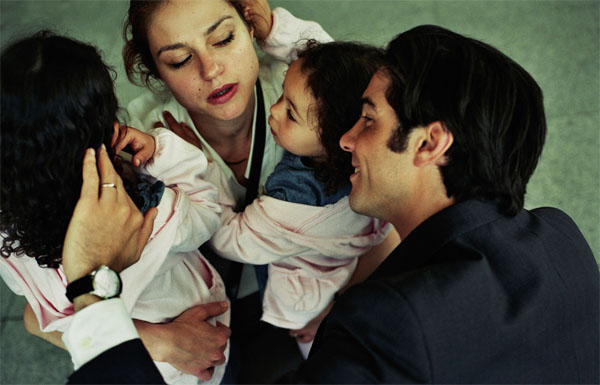“If ever there was a picture about the more taxing demands of motherhood, and also wifehood, it’s the finely wrought domestic drama Our Children, by Belgian director Joachim Lafosse,” begins Tim Robey in the Telegraph. “Based on a shattering true story, it depicts the piecemeal breakdown of Murielle, a depressive teacher played by Émilie Dequenne, star of the Dardenne brothers’ Rosetta (1999), in a career-topping performance. Her marriage to a Moroccan immigrant, Mounir (Tahar Rahim), dictates an unusual household arrangement, since his surrogate father, a family doctor played by Rahim’s Prophet co-star Niels Arestrup, is a permanent fixture in their lives. As Murielle gives birth to one child after another, Mounir shirks his duties as a father, leaving her hopelessly overburdened and in the grips of looming mental illness.”
“In bringing to the screen potentially lurid, ripped-from-the-headlines material, Joachim Lafosse seems hellbent on avoiding any hint of sensationalism, maintaining an objective distance while keeping his story’s graphic details conspicuously off screen,” wrote Andrew Schenker in Slant, when the film screened at the New York Film Festival last October. “If that makes Our Children, a fictionalization of a real-life story of a harried woman driven to desperate measures, seem occasionally too icily removed, the film compensates through its perpetual concern with understanding its characters and their untenable situations.”
And Nick Schager wrote in the Voice: “Habitually arranging his characters in dynamic push-pull arrangements and framing them in doorways and via other people’s foreground heads in tense close-ups to suggest constriction even during happy times (such as the birth of the couple’s first daughter), Lafosse creates intense intimacy without ever partaking in hysterical melodrama. His placid Dardennes-inspired aesthetic allows for contemplation of the forces at play—resentment, self-doubt, and feelings of subjugation and loss of identity—on Murielle’s increasingly fragile mind and heart.”
Our Children now opens in the UK, and in the New Statesman, Ryan Gilbey notes that it “gets straight to the point. Its second image is a wide shot of the tarmac on an airport runway. Four tiny, white coffins are being fed along a conveyor belt into the hold of a plane. From this distance, they might be sugar lumps or baby teeth…. Before the film’s inevitably distressing conclusion…, Dequenne is given the colossal task of visualizing the exact point of Murielle’s breakdown. In an unbroken, three-and-a-half minute take, she sings along to the radio as she drives, her melodious voice gradually sabotaged by sobs. Those of us who are forever citing Nicole Kidman’s tear-stained close-up in Birth as the ultimate example of wordless acting will now have to update our reference points.”
More from Nigel Andrews and Antonia Quirke (Financial Times, 4/5), Peter Bradshaw (Guardian, 4/5), Ashley Clark (Little White Lies), Trevor Johnston (Time Out, 5/5), Guy Lodge (In Contention, A-), Drew Taylor (Playlist, C-), and Kieron Tyler (Arts Desk). And Sam Wigley interviews Lafosse for the BFI.
Update, 5/13: “Our Children is part Greek tragedy, part case history, part admonitory social parable about class, race and colonialism,” writes the Observer‘s Philip French. “It’s a quiet, immaculately acted study of appalling cruelty committed unconsciously by those who believe they’re acting in the best interest of others.”
For news and tips throughout the day every day, follow @KeyframeDaily on Twitter and/or the RSS feed. Get Keyframe Daily in your inbox by signing in at fandor.com/daily.




